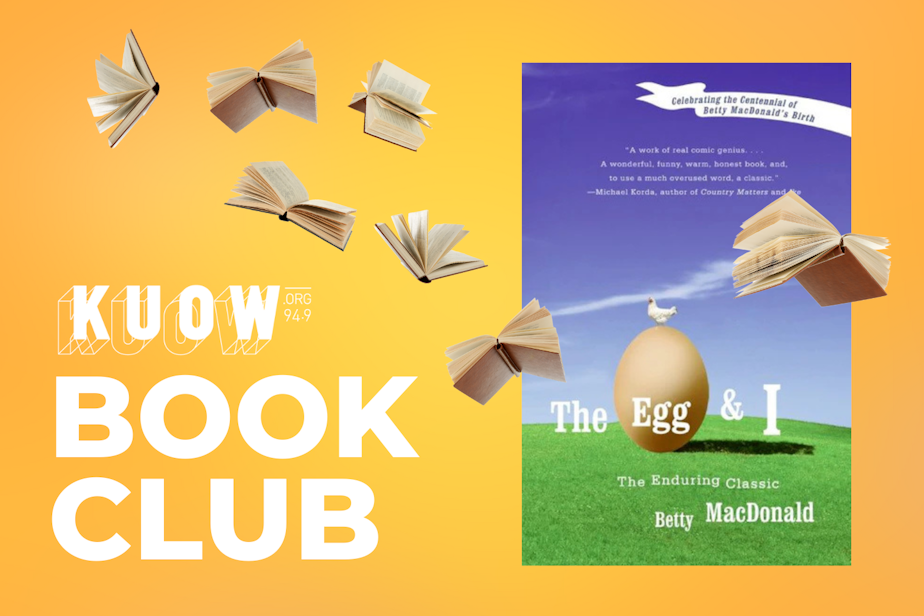The humor in 'The Egg and I' masks a much darker story

This is the KUOW Book Club. We just finished reading Betty MacDonald's enduring classic, "The Egg and I." I'm your club guide, Katie Campbell. Let's get into it.
I
'll be honest with y'all: I did not particularly enjoy "The Egg and I." Sincerest apologies to the late author, whom I'm glad I can't interview for this final analysis.
I say that because I wouldn't want to do her any more emotional abuse than she endured during her life — abuse she masked with humor. The thing is, as we're reading this account of early 1900s life on the Olympic Peninsula, modern readers perhaps more easily recognize the signs of someone trying to laugh away their trauma. I'm not fooled, Betty.
RELATED: Subscribe to the KUOW Book Club newsletter here
She dropped much of the veneer in the final two chapters, recounting the terrifying brush with a massive fire that nearly engulfed the farm, among other things, in the final pages. And you can feel her resolve finally giving way:
Sponsored
And when she meets Mrs. Weatherby, a woman who seems to be on her own with four children in a moldering house and mental illness, Betty sees a not inconceivable future in which her own loneliness leaves her untethered to the world.
It's hard to image Betty admitting as much earlier in the book, when she was maintaining her farcical recounting of that point in her life, which she eventually left behind. If Betty were still with us today, I'd ask her whether she again found herself worn down as she wrote the book. Did the humor slowly fade as she remembered each of her husband's slights? Each moment of isolation? The perfectly reasonable things to fear, even if Bob didn't think she was right to fear them?
I know it was another time, and women's place in society was not what it is today. But time and again, Betty reminds us just how little her Bob thought of her.
Sponsored
I felt validated in that view when I heard from our fellow reader, Jane: "'The Egg and I' kind of blind-sided me with the horror of making an abusive marriage funny," she wrote in an email. I could not agree more. What was marketed as a "humorous memoir" and made into a "romantic comedy" film in 1947 was more of a vaguely comedic tragedy.
Consider his reaction when she returns home one evening, certain she's been followed by some predator in the woods. Their home being smack in the Olympic wilderness, that's not an unrealistic suspicion. Yet Bob cannot believe that Betty knows anything about anything out there.
His lack of appreciation for Betty nearly costs him his life, as he traipses out into the woods and is attacked by a bear. Frankly, I was rooting for the bear.
I think what bothers me most about Bob is his apparent need to conquer everything around him rather than admire and respect it. Even though Betty is not fond of farm life and is often disdainful of the hardships the natural world doles out, she is able to stop and bask in it. Consider this passage, after she and Bob visit a massive logging camp with a friend:
This simple difference says a lot actually.
It makes me think back to Tim Egan's "The Good Rain," and his telling of how the logging industry forever changed our region's pristine forests. People like Bob cheered it on, seeing only more opportunities for commerce and getting a piece of it for himself. Betty saw poetry in what existed long before humans ever even thought of the word "commerce."
I most enjoyed "The Egg and I" when Betty explored that poetry, letting her own whimsical depictions of the mountains around her go on for long, luscious paragraphs. But it was most tedious in the many pages relating her own daily tedium. I would have liked the book much more if she'd skipped the lengthy descriptions of her many chores, which she knew to be a bore anyway.
RELATED: Chickens are just the fall guy in this funny, blunt tale of life on the Olympic Peninsula
And the chickens. The chickens did not deserve Betty's hatred. They were barely mentioned at all when it comes down to it! When Betty says, on page 149, "I really tried to like chickens," I found myself scoffing — because I really tried to like "The Egg and I." But like Betty with her brood, I failed in the end.
Sponsored
It's a fine book, and maybe I couldn't fully appreciate it because I read her dreary descriptions while sunbathing in Australia for the holidays. Still, it wouldn't be my first choice if I had to pick this month's book again. Or as Betty said of her marriage to Bob:




